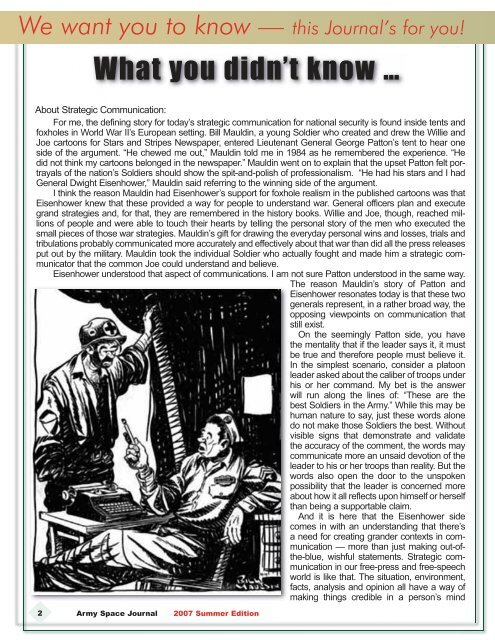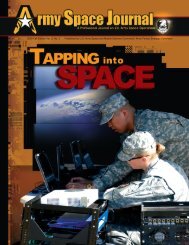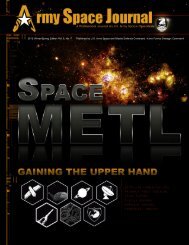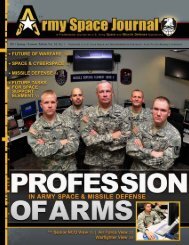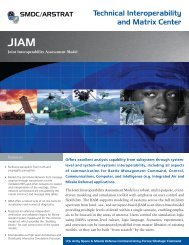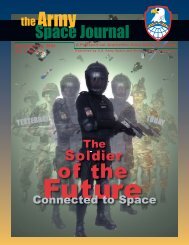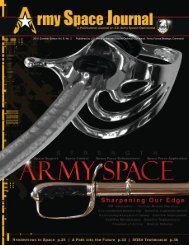Volume 6, Number 3 - Space and Missile Defense Command - U.S. ...
Volume 6, Number 3 - Space and Missile Defense Command - U.S. ...
Volume 6, Number 3 - Space and Missile Defense Command - U.S. ...
You also want an ePaper? Increase the reach of your titles
YUMPU automatically turns print PDFs into web optimized ePapers that Google loves.
We want you to know — this Journal’s for you!<br />
What you didn’t know …<br />
About Strategic Communication:<br />
For me, the defining story for today’s strategic communication for national security is found inside tents <strong>and</strong><br />
foxholes in World War II’s European setting. Bill Mauldin, a young Soldier who created <strong>and</strong> drew the Willie <strong>and</strong><br />
Joe cartoons for Stars <strong>and</strong> Stripes Newspaper, entered Lieutenant General George Patton’s tent to hear one<br />
side of the argument. “He chewed me out,” Mauldin told me in 1984 as he remembered the experience. “He<br />
did not think my cartoons belonged in the newspaper.” Mauldin went on to explain that the upset Patton felt portrayals<br />
of the nation’s Soldiers should show the spit-<strong>and</strong>-polish of professionalism. “He had his stars <strong>and</strong> I had<br />
General Dwight Eisenhower,” Mauldin said referring to the winning side of the argument.<br />
I think the reason Mauldin had Eisenhower’s support for foxhole realism in the published cartoons was that<br />
Eisenhower knew that these provided a way for people to underst<strong>and</strong> war. General officers plan <strong>and</strong> execute<br />
gr<strong>and</strong> strategies <strong>and</strong>, for that, they are remembered in the history books. Willie <strong>and</strong> Joe, though, reached millions<br />
of people <strong>and</strong> were able to touch their hearts by telling the personal story of the men who executed the<br />
small pieces of those war strategies. Mauldin’s gift for drawing the everyday personal wins <strong>and</strong> losses, trials <strong>and</strong><br />
tribulations probably communicated more accurately <strong>and</strong> effectively about that war than did all the press releases<br />
put out by the military. Mauldin took the individual Soldier who actually fought <strong>and</strong> made him a strategic communicator<br />
that the common Joe could underst<strong>and</strong> <strong>and</strong> believe.<br />
Eisenhower understood that aspect of communications. I am not sure Patton understood in the same way.<br />
The reason Mauldin’s story of Patton <strong>and</strong><br />
Eisenhower resonates today is that these two<br />
generals represent, in a rather broad way, the<br />
opposing viewpoints on communication that<br />
still exist.<br />
On the seemingly Patton side, you have<br />
the mentality that if the leader says it, it must<br />
be true <strong>and</strong> therefore people must believe it.<br />
In the simplest scenario, consider a platoon<br />
leader asked about the caliber of troops under<br />
his or her comm<strong>and</strong>. My bet is the answer<br />
will run along the lines of: “These are the<br />
best Soldiers in the Army.” While this may be<br />
human nature to say, just these words alone<br />
do not make those Soldiers the best. Without<br />
visible signs that demonstrate <strong>and</strong> validate<br />
the accuracy of the comment, the words may<br />
communicate more an unsaid devotion of the<br />
leader to his or her troops than reality. But the<br />
words also open the door to the unspoken<br />
possibility that the leader is concerned more<br />
about how it all reflects upon himself or herself<br />
than being a supportable claim.<br />
And it is here that the Eisenhower side<br />
comes in with an underst<strong>and</strong>ing that there’s<br />
a need for creating gr<strong>and</strong>er contexts in communication<br />
— more than just making out-ofthe-blue,<br />
wishful statements. Strategic communication<br />
in our free-press <strong>and</strong> free-speech<br />
world is like that. The situation, environment,<br />
facts, analysis <strong>and</strong> opinion all have a way of<br />
making things credible in a person’s mind<br />
2<br />
Army <strong>Space</strong> Journal<br />
2007 Summer Edition


